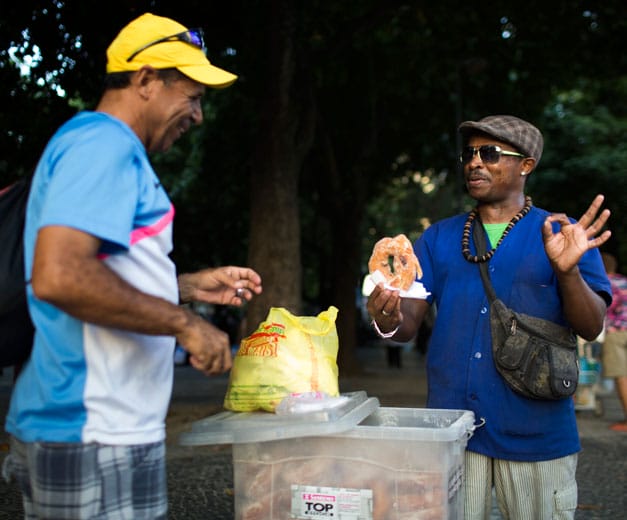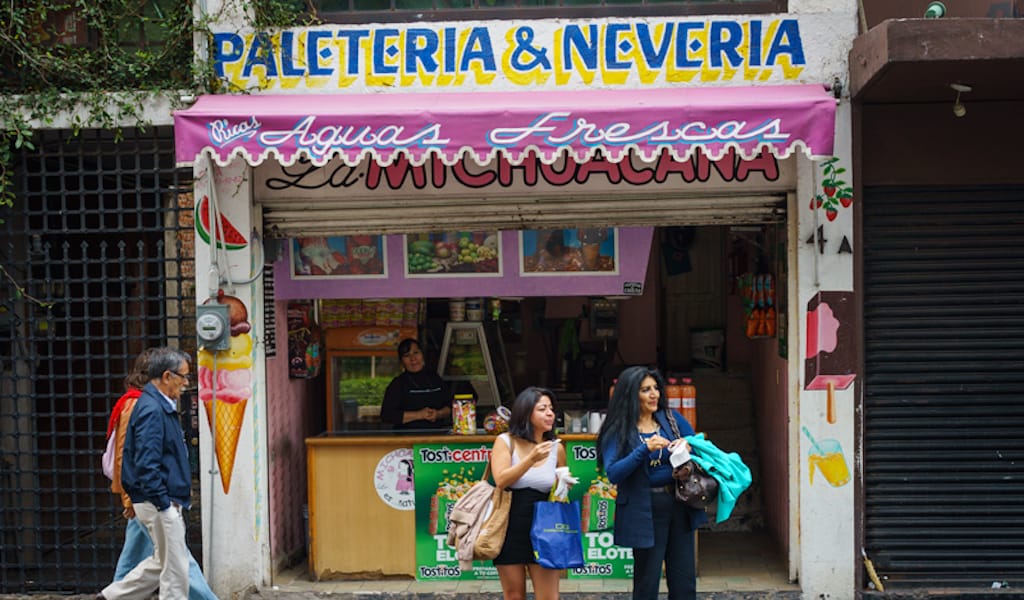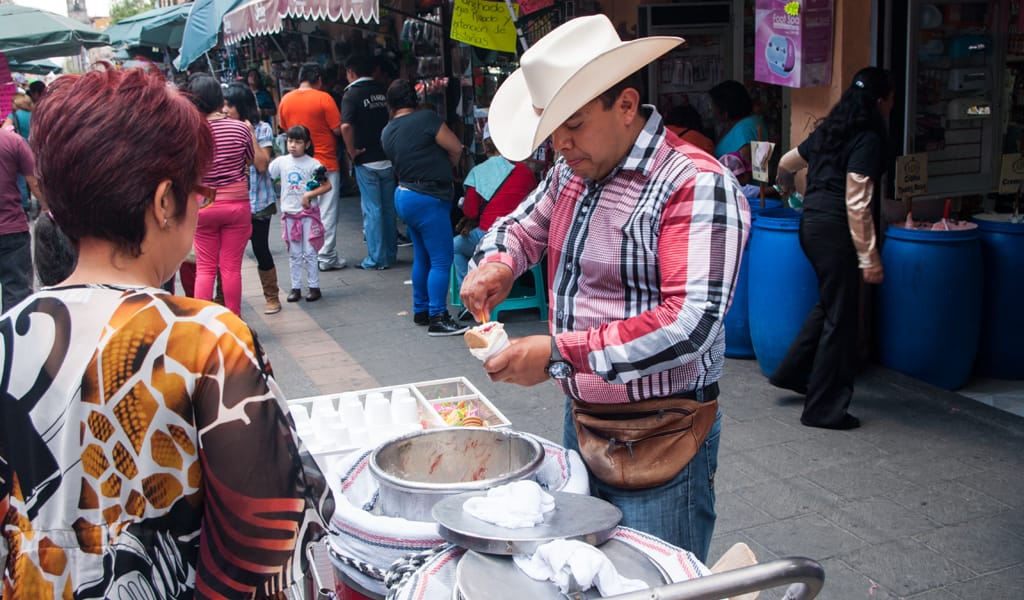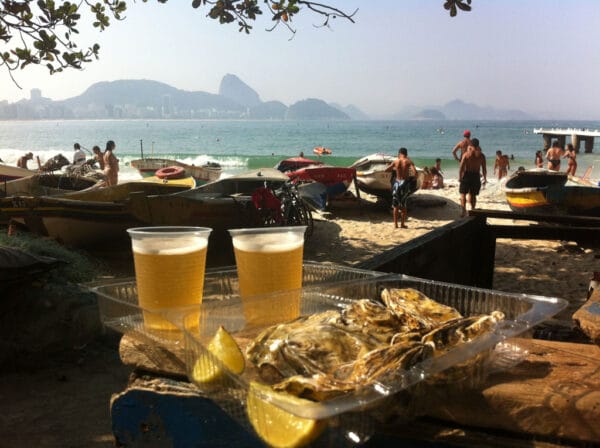Erisvaldo Correia dos Santos dreamed of being a star. He saw himself as a humorist, a singer maybe, and most certainly an artist. But the scrabbling northeastern immigrant came in 2005 to Rio, the Brazilian city of dreams, with just 20 reais – about $9 – in his pocket and a family to feed.
“When I came here, I was hard as a coconut,” dos Santos says, meaning he was hard-up for cash.
Nothing a little self-deprecation and naughty jokes couldn’t make up for. Food and guilty pleasure have a long, intertwined history, going all the way back to Adam and Eve. In that vein, snickering Brazilians have long appropriated the verb comer (“to eat”) to mean a more carnal type of consumption. Rosca, the word for “screw,” has been turned into something even more blush-worthy, referring to other, fleshier things that can be screwed, and is also used to refer to a nicely round doughnut.
In particular, rosca has come to be used to describe a “screwable” lower part of the body (think doughnut hole and extrapolate from there). Capitalizing on Brazilians’ fondness for roscas (the edible kind) and big bottoms – the behind is to Brazilian men what breasts are to their American counterparts, with dirty magazines here often showing pictures of ample naked women from behind and one of the country’s celebrities a woman who calls herself “Mulher Melancia” (watermelon woman) in reference to her juicy tush – dos Santos found a gastronomical gimmick cariocas are both delighted and a little nervous to comer.
“One, two, three, four! Do what’s cool and thrust your rosca up high!” dos Santos belts out to announce his arrival to the streets of Catete and Largo do Machado each day of the week. The short, 40-something performer then swivels his hips as he balances a cooler-size plastic case of steaming, cakey doughnuts on top of his head.
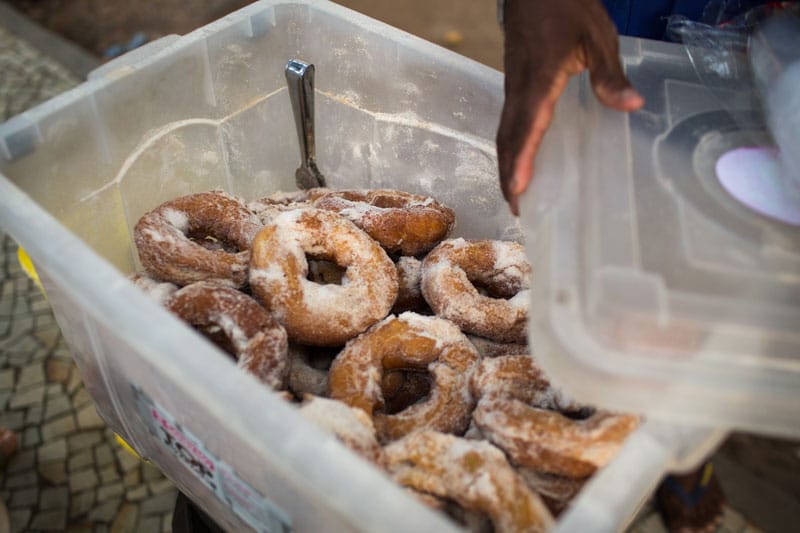
Flashing smiles that blur the line between cool and creepy, dos Santos carries his routine for blocks, from Rua Pedro Américo down to the Largo do Machado plaza.
“Come look at my rosca, it’s wide and sweet!”
“All ages can eat my rosca.”
“Senhora, you’ve been eating my rosca every day!”
“Come and get it now, my rosca is on fire.”
“Hi lady, do you want to eat my rosca today?” A passerby giggles. “Not today!”
“My rosca used to be 50 cents. Now it’s three reais. But it’s wider.”
“There are people who call me at dawn to eat my rosca.”
“She’s eating my rosca in the middle of the street!”
Dos Santos’s doughnut is cakey and soft but not glazed; he advertises it as sequinho (very dry). He tops it with a generous helping of cinnamon and sugar and returns home after a 10 a.m.-to-2 p.m. shift for a lunch break, after which he cooks up more hot roscas for the afternoon. In winter, when cariocas want a warm treat, he sells 400 roscas a day to the doormen, newspaper stand owners and dedicated fans who follow him down the neighborhood’s streets.
He’s often asked if he’s gay, and dos Santos will laugh it off and say he has a kid. “Even my son asks: Is my dad gay?”
As a female client makes a joke to dos Santos so crude that we will not spoil appetites by repeating it here, he turns to us, visibly alarmed, and says the joke has gone too far. “For me, this is just work!”
This review was originally published on November 6, 2013.
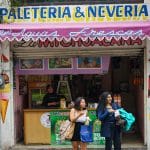 August 16, 2018 Paletas and Raspados
August 16, 2018 Paletas and Raspados
Mexico City is blessed with great weather all year round. Summer is not very hot because […] Posted in Mexico City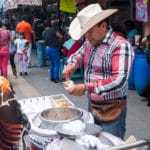 August 14, 2017 Cactus Popsicle
August 14, 2017 Cactus Popsicle
In Mexican cuisine, sweets are for the most part simple treats that are enjoyed at the […] Posted in Mexico City August 1, 2016 Olympian Appetites
August 1, 2016 Olympian Appetites
Athletes, spectators and everyone else gathered in Rio for the Summer Olympics will have […] Posted in Rio
Published on November 27, 2015
Related stories
August 16, 2018
Mexico CityMexico City is blessed with great weather all year round. Summer is not very hot because it’s the rainy season, and at 2,200 meters above sea level, things cool down very fast as soon as the rain starts falling. However, we still get our hot days, especially in the spring, and even early afternoons in…
August 14, 2017
Mexico CityIn Mexican cuisine, sweets are for the most part simple treats that are enjoyed at the park, market or beach, such as caramelized fruits and vegetables, blocks of nuts or amaranth seeds held together with honey, or small rice paper cakes filled with honey. The common denominator of most of these sweets is their simplicity.…
August 1, 2016
RioAthletes, spectators and everyone else gathered in Rio for the Summer Olympics will have no shortage of good eating options – and not just in the usual touristed areas. We’ve rounded up some of our favorite spots around town. CADEG The 100,000-square-meter market is divided into three warehouse-style floors, with a pavilion just for flower…







































